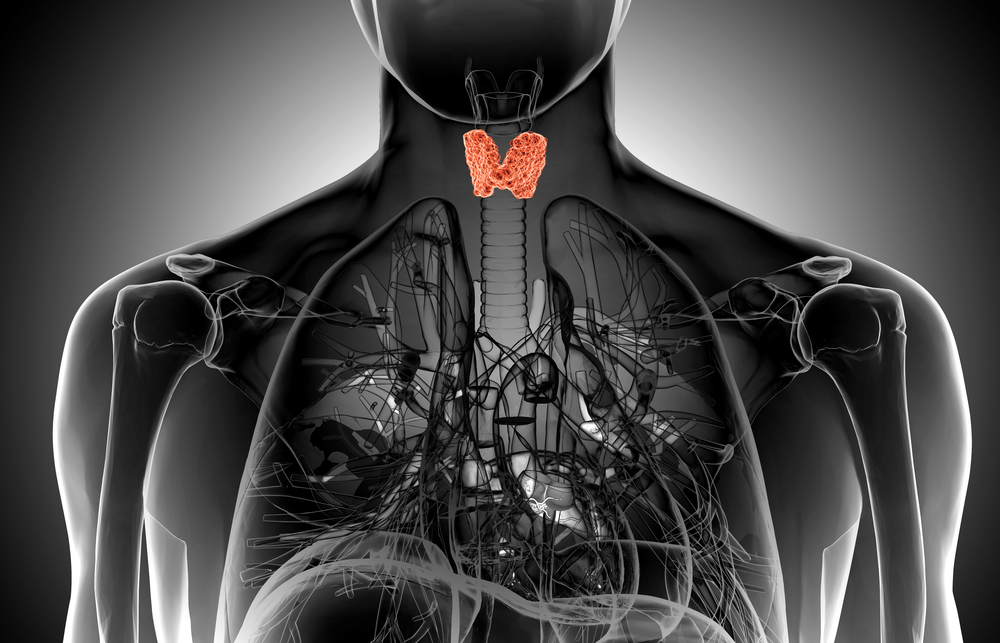Is Your Thyroid Destroying Your Gut Function?

If you’re struggling with constipation, diarrhea, or stomach pain… it may be related to your thyroid. In fact, your thyroid might be a root cause for your current health issues. It was for me.
My acne never seemed to go away even though I was doing everything right for years. And my energy wasn’t really all that robust. Not to mention every time I traveled I’d get constipated. It wasn’t until I fixed my thyroid that my skin got clear, energy really took off and the travel constipation stopped happening.
This is an example of how the body is a complex system and just focusing on the pain can lead to symptom management and never getting to the root cause of your problems. In today’s post, we’ll explore why anyone with gut issues should get their thyroid tested.
Why is the thyroid so important?
It’s a hormone factory responsible for two seriously important hormones that do a lot of heavy lifting in the body, like running your metabolism. Every single cell in your body has a need for thyroid hormone… and when things go wrong, your whole body takes a hit.
It starts with the metabolism…
Our Metabolism Isn’t as Complex as it Seems
Our human metabolism is made up of all the chemical reactions that take place inside your body:
- Fat metabolism
- Carbohydrate metabolism
- Protein synthesis
- Protein catabolism
- Insulin secretion
- Cognition and nervous system responses
- And cardiac output
… just to name a few general ones.
Think of the metabolism as the cells in your body doing exactly what they need to do, when they need to do it. Depending on the location of these cells, certain jobs or reactions will be performed. Add up all of these reactions and this is your metabolism.
The cells in our bodies are told what to do by inputs from messengers. The messenger inputs that give cells directions are mostly hormones. So, if your hormones are either high or low, then problems begin to occur with the reactions inside the cells (metabolism). This cascades into symptoms we can actually feel. Particularly, too much or too little hormones are problems, because our cells will perform too many or too few reactions as signals are received.
Now, let’s get nerdy about Thyroid Hormones and the role they play with your gut.
How the Thyroid Gland Impacts Your Digestion
Remember too much thyroid hormone is just as bad as too little. When thyroid dysfunction is overactive it’s called hyperthyroidism. There is a common hyperthyroid autoimmune condition called Graves’ disease. When there isn’t enough thyroid hormone, it’s called hypothyroidism and the autoimmune condition is called Hashimoto’s thyroiditis. Either one of these scenarios affects the gut.
Much of what the studies focus on are constipation and diarrhea as a result of thyroid hormones affecting the following areas of the gut:
- Digestive juice excretion
- Rate and strength of peristalsis
- T4 to T3 conversion
- Gut flora’s role in level of thyroid hormone
There have been many studies showing that those with thyroid dysfunction are prone to developing specific GI issues.
For instance, those with Grave’s disease were found to have 5 times the risk of developing Celiac disease and there are associations with Grave’s and Crohn’s. And IBD has been connected with patients with Hashimoto’s thyroiditis.
Having a happy thyroid is so crucial to having a happy body, because the thyroid makes and secretes the hormones responsible for all this metabolism/digestive stuff. Thyroid hormones help turn the cogs of the great machine, so to speak. But to understand the root of why thyroid hormones are low or high, we first need to talk about the 2 common ones:
The Thyroid Hormones T4 and T3, which affect nearly all parts of digestion.
Meet Your Friends T4 and T3 (and How Your Gut Health Influences Them)
The thyroid gland makes T4 in response to the brain sending it a chemical messenger called Thyroid Stimulating Hormone (TSH). But most cells in the body want T3, which means this whole process gets complicated fast. When I say thyroid hormones I’m speaking about T4 and T3:
- T4 – Tetraiodothyronine aka Thyroxine (think inactive form)
- T3 – Triiodothyronine (think active form)
T3 and T4 are made from iodine (notice: tetraiodothyronine) and can’t be synthesized without it. Produced directly by the thyroid, these hormones enter the bloodstream and are able to talk to all kinds of cells and help direct them in their jobs.
So, say that the thyroid has just squirted out some of its hormones (I don’t know if it actually “squirts” but I imagine it that way), the majority of that hormone will be T4. This T4 actually gets converted into T3 in peripheral tissues. One of these peripheral tissues is THE GUT! As I mentioned above, T3 is the main hormone that the cells want and it’s easiest to think of T3 as the active thyroid hormone.
Many of the problems people have with thyroid hormones is in this conversion.
Conversion is Key
The conversion of T4 to T3 is not so simple; neither is the gut’s role in all of it. Conversion occurs in the kidneys, liver and gut, but it’s not just about what tissues are doing the converting. The health of the tissue and the enzymes involved in the conversion are vital. There are several enzymes, like Type I Iodothyronine 5’ deiodonase (5’-DI1), and micronutrients, like Selenium, that play a role in the process of converting T4 to T3.
Basically, there are a lot of steps in this process that could affect the amount of T3 produced. Scientists are still trying to uncover all of it, but they are finding that the gut may play a critical role in thyroid hormone regulation as well as in storing T3. And healthy gut flora have been found to assist in these T4 to T3 conversions, while bad bacteria have been shown to reduce plasma concentrations of thyroid hormones through endotoxin release.
To sum it up, a healthy gut and gut flora are important for converting T4 to T3 and to keep our cells happy and running properly.
Regardless of the health of your gut, if the rest of your body is producing too little or too much TSH, T4 or T3, then you might experience diarrhea or constipation.
Is Your Thyroid Causing Diarrhea or Constipation?
Diarrhea and constipation are typically never caused by one singular problem, so I’m not totally blaming the thyroid. What I am saying is if you’re someone who’s been eating SCD or Paleo, using lots of supplements and still seem to have motility issues then it could be because of your thyroid.
The research suggests that too much thyroid hormone (hyperthyroidism) in the body is linked more heavily to causing diarrhea. There could be several reasons for this diarrhea including:
- Fat malabsorption
- Intestinal hypermotility
- Hypersecretion of bile
- Pancreatic enzymes and secretin in small intestine tissue
- And increased intestinal transit time
This is basically saying that your digestive system is running on high and this super speedy processing results in wasted food and loose stools.
In contrast, constipation is typically found in conjunction with hypothyroidism. This is thought to be due to slower intestinal peristalsis, which is the movement of food and waste through our intestines. If the cells that control this have a lowered metabolism due to less hormone signals, the waves are slower and/or less powerful. However, there could be other culprits as this paper points out.
And lastly, this study shows 54% of people with a sluggish thyroid also had SIBO, which may suggest that we should always be looking at these two at the same time.
Always Look at the Thyroid and the Gut?
Beyond the study above, why might we always want to look at this duo together? Well, it comes back to how systems work.
When we look at how parts of systems talk to one another, we always want to find the feedback loops. In the body, these are pathways of signals that feedback to other areas. For instance, we’ve already mentioned in this article that thyroid hormones affect how the gut moves, but the gut can also give signals back to the thyroid.
The two “talk” back and forth through many signals such as the conversion of T4 to T3 in the gut, gut flora and levels of inflammation in the gut. Let’s say, for example, you’ve got a bunch of inflammation from a parasitic infection (which reduces nutrients), the conversion of T4 to T3 can go down. Also, higher levels of inflammation could change the output of TSH from the brain. Furthermore, the gut’s ability to digest and absorb critical nutrients, like the Iodine and Selenium necessary for proper thyroid hormone health, is very important.
It’s the old chicken or the egg scenario; which one came first? And anytime we face this problem, the best thing to do is assume nothing and test and address both at the same time. A big mistake happens when Hashimoto’s or Graves’ patients don’t also pay attention to their gut.
How to Fix Your Thyroid and Your Gut (at the Same Time)
Great practitioners will be thinking about testing and supporting both of these systems at the same time. Unfortunately, this isn’t the case for most of us (including me). Most of even my better practitioners ignored the gut-thyroid connection, and it was affecting me big time!
My energy wasn’t very reliable, my skin was still broken out and dry, and overall I didn’t really feel amazing. Of course, that was until I went into this area, which is why I think it pays to be in the know.
After all, you’re the CEO and ultimately responsible for your health.
If fact, if you understand how great practitioners attack this gut-thyroid connection you can actually guide your current doctor in doing so as well. It’s not always easy, but it’s very simple.
On our 2.5-hour gut-hormone presentation, I went into which thyroid tests are useful, optimal lab ranges that most great practitioners recommend and common treatment mistakes to avoid. Not to mention, I shared the exact step-by-step script and memory cheat I use with doctors. Because, let’s face it, who hasn’t gone into an appointment and forgotten what they were going to say?
Grab access to the gut-hormone presentation here:
http://energyhelp.scdlifestyle.com/
– Steve
Did You Like this Article?
Subscribe to our newsletter to receive email notifications, some ways to find relief, and next steps.
